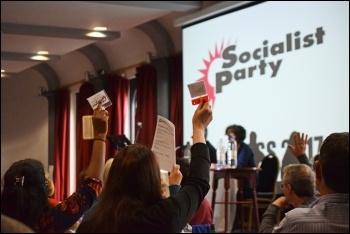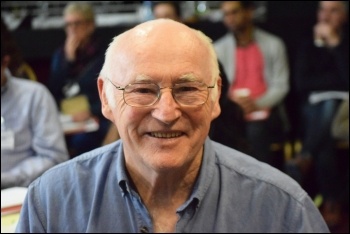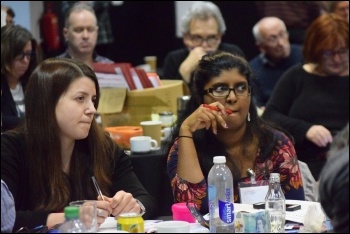The Socialist Party’s national congress 2017 took place in London from 11 to 13 March, attended by delegates and visitors from Socialist Party branches all over England and Wales, as well as international guests.
Below are reports of some of the sessions on the world, Britain, Spain and youth. Others included building the Socialist Party, organising our publications and a report of the work of the Committee for a Workers’ International. We also heard from Paul Murphy, Irish TD (MP) and member of our Irish sister party, who is facing trial in April on charges of ‘false imprisonment’ for a peaceful sit-down protest.
A fighting fund appeal raised £13,070 and a membership subs appeal led to 50 members increasing their subs by a total of £576 a month at the event.
All attendees left confident and determined to build the Socialist Party and the struggles of workers and young people in the next 12 months.
Upheaval and fightback in a new, exciting world
Kevin Parslow
The first discussion of the 2017 Socialist Party congress was on the current world situation, introduced by Peter Taaffe, general secretary, and replied to by Judy Beishon of the executive committee.
Peter said that the previous weekend’s demo in defence of the NHS was a fitting curtain raiser to this congress and its angry mood and working-class composition reflected a new, exciting world.
Trump
Peter explained how the election of Trump as US president has built massive opposition worldwide. The ‘whip of counter-revolution’ has provoked upheaval both domestically and internationally against an increasingly uncertain and dangerous background.
Deep splits are opening among the ruling class because of Trump, which the working class will notice and take advantage of as they defend their rights and living standards. Even this early in his presidency, sections of the capitalists are talking about impeachment or other ways of removing Trump, citing the Watergate scandal that removed disgraced President Nixon in 1974.
It is clear that Trump is attempting to pursue an aggressive ‘America First’ economic policy against other national capitalist classes, the aim being to put the rest of the world on rations. This will provoke a retaliatory ‘China First’, ‘Europe First’ and so on.
Trump will also try to pursue a more aggressive foreign policy despite six out of ten people in the US opposing big foreign adventures.
This in a ‘multipolar world’ dominated by three powers: the US, China and Russia. Although the US is still economically and militarily ahead, China is increasing its military power, challenging the US particularly in the Asia-Pacific region. Yet both are worried by the developing crisis in the Korean peninsula.
Russia, although economically weakened since the collapse of Stalinism and the fall in the price of oil, still has big military spending and its reach is still considerable, as shown in Syria where it has been able to prop up the ailing Assad regime against its opponents in the civil war.
This will have consequences in the Middle East with its patchwork of religious and national groups defending their interests. The situation could be compared to Europe and the 30 Years War of the 17th century. There will be no real peace and no solution to the region’s intractable problems on the basis of landlordism and capitalism in the Middle East.
Europe could find itself in conflict with the US over the economy. Europe’s economies are very weak. The social catastrophe in Greece continues and German capitalism continues to take a hard line on Greece’s debt.
Explosive
The explosive situation in southern Europe was emphasised by comrade Beatriz from Izquierda Revolucionara in Spain, who the Committee for a Workers’ International (CWI – to which the Socialist Party is affiliated) is in a unification process with. She highlighted the rising militant mood, particularly among the school student youth who defeated the right-wing government’s proposed education laws through their union Sindicato de Estudiantes. Left-wing party Podemos has also rejected a conciliatory approach to ex-social democratic party PSOE, which is divided over backing the right-wing government.
Peter pointed out there is not just a crisis of capitalism and the right but also social democracy and its advocates, which is not ‘left’ and increasingly unable to put forward solutions to the problems of the working class and youth. A number of elections in European countries this year could see the strengthening of right-wing forces because of the weakness of the left. But this will prove temporary as these organisations cannot solve the problems of capitalism either.
Peter concluded by reiterating that the whole world is in crisis and there are huge changes ahead. The middle layers in society – students, junior doctors in England and others worldwide – are being forced into action and will join the inevitable resistance of the working class.
This mood of anger will present the CWI with big opportunities, as has been shown in the US with our allies in Socialist Alternative since the election in Seattle of Kshama Sawant. The coming battles will then lay the basis for mass revolutionary parties and a mass socialist international.
Volcanic struggles and uncertainty for the establishment in Britain
James Ivens
Two features increasingly define Britain’s politics. First: the possibility of volcanic struggle on many various issues. Second: uncertainty, as established powers lose their authority and coherence.
The ‘British perspectives’ document the Socialist Party’s 2017 congress agreed says this: “There is no period of history that corresponds exactly to the times we are living through.”
Deputy general secretary Hannah Sell introduced a thorough discussion on political prospects and the strategies socialists need. Following 27 excellent contributors, executive committee member Clive Heemskerk summed the discussion up.
Hannah pointed out that the Socialist Party has already made a qualitative difference in the early skirmishes of this new era.
The victorious campaign to save the Butterfields estate in east London. Tube bosses’ retreat in the face of a solid strike by station staff. The mass movements defending Huddersfield Royal Infirmary in Yorkshire and the Glenfield children’s heart unit in Leicester.
All are important local battles where our ideas and members have been central.
But we have had a national impact too. Socialist Party members were key to achieving the tremendous demonstration for the NHS on 4 March.
NHS
We are not alone in seeing that Theresa May’s attacks on the NHS could be her ‘poll tax’ – it could bring down the government. A movement on the NHS would take in not just the towns and cities, but even the rural areas and Tory shires, as reports already show.
The Tories have given a cosmetic impression of unity, aided by media focus on the divisions in Labour. But government defeats in the Lords have shown the opposite is true.
The unprecedented makeup of Northern Ireland’s assembly, and the returning question of Scottish independence, could cause constitutional crises.
May’s weakness is also highlighted by her retreat on a national insurance hike for the self-employed.
The government is shaky and factionalised. An early general election is possible, but not definite. The capitalist class does not want one. However, May could be forced to call one to regain control.
The EU is the main crack. Hannah reminded congress that “last year we said the working class could pick up the referendum and use it as a stick to hit the Tory party with. We have been proven right on that.”
Still, the prospects for Brexit are uncertain. The European Union may not even exist, at least in the same form. A mass campaign for a working class, internationalist Brexit is still needed.
The Leave vote was not based on widespread racism. We can unquestionably win the working class to a socialist position on immigration – on guaranteeing jobs, homes and services for all. But this will not happen on the basis of the Blairites’ methods: lofty moralising while implementing austerity.
Nonetheless, anti-racism will be an important area of work. The big demonstrations against Donald Trump’s racist agenda have shown the openness to this. Building for ‘Day X’ school student walkouts could help give structure to this anger.
Schools themselves could be the focal point of a resistance movement. The new funding formula will mean massive cuts to staff. We call for schools to use their power to set deficit budgets, and build campaigns to win back the funding.
Housing too is in complete crisis. The government is under pressure to retreat on several points of its Housing Act. But Labour councils must share the blame for creating this crisis. They have the financial capacity to build 100,000 council homes this year alone.
We support any Labour councillor seriously prepared to fight the cuts. That is and always has been our position. But the leaders of the Labour left still refuse to call for anti-cuts council candidates, accepting the right’s self-interested blindness to our alternative.
In spite of the fact that councils, like parliament, are strongholds of the Labour right, the sheer scale of the cuts could force some to stand up.
Our programme – using councils’ financial clout to stop austerity and build a campaign to win the funding back – resonates well with local authority workers and community campaigners. It is still right for the Trade Unionist and Socialist Coalition to stand in the elections against pro-cuts Labour candidates.
And it is still essential to take part in the struggle in Labour, and put forward what Corbynism needs to win. Our goal is a mass party of the working class.
But our role in the class struggle outside Labour will have the biggest effect on this movement – on the streets and picket lines, in the workplaces, schools and estates.
Tom Watson’s ‘Project Anaconda’ strangulation of Corbyn is winning. But its final victory is still not certain. A new attempt on the leadership, or a big upswing in class struggle, could still stagger the right and push Corbyn left.
A fresh economic collapse would also cause turmoil. British capitalism has tiny, anaemic productivity. This makes it very vulnerable in a crash.
Under cover of the last crash, the public sector pay cap has been in place for seven years. A million workers are under the yoke of zero-hour contracts. Many more are walled in by personal debt.
New unionism
But, Hannah pointed out, there has been a response. “We are seeing the beginning of a 21st century version of new unionism.”
Small, independent unions have led militant action. Even parts of the middle class are adopting the methods of the working class movement, as the valiant junior doctors’ strikes showed.
Furthermore, “the battle between capital and labour is getting much sharper on both sides.” Employers make attempts to break unions outright; workers increasingly go for strikes to the finish rather than symbolic one-day actions.
The additions to the anti-union laws are a new hurdle. Some right-wing union leaders will be relieved, imagining national or coordinated action is off the agenda. We cannot allow that. Any attempt to victimise trade unionists under the Trade Union Act would immediately pose the need for a 24-hour general strike.
The working class went into the 2007-8 crisis unprepared, with a lower level of trade union organisation, without a mass party of its own, without a broad understanding of socialist ideas. But Corbynism, bitter strikes and mass mobilisations on the streets show that all this is changing.
The Socialist Party is entering the most exciting era in its history. We have learnt a lot.
Our role in events is important, but not yet decisive. If we continue to fight boldly for our ideas, the battles we have led in previous decades will seem tiny compared to the all-out class conflict which is coming.
Spain: Solidarity from our co-thinkers fresh from leading mass struggles
Scott Jones
“We share the same political DNA,” said Beatriz Garcia from Izquierda Revolucionaria (IR).
She brought solidarity to our congress and described the massive struggles led by IR members, such as the huge strikes and demonstrations by the Sindicato de Estudiantes (SE – student union) against right-wing education counter-reforms. This movement led to a victory, defeating aspects of the reforms.
Young people
IR’s leading position in the student union has helped the party to develop many youth branches, including five in Madrid alone.
Helen Pattison contributed from the floor about her visit to the conference of SE in the midst of the movement and said she witnessed the “the most amazing thing” she’d seen when hundreds of 14 to 16 year olds formed an orderly queue to join the SE. Many of them also expressed an interest in joining IR.
This mass mobilisation was followed on International Women’s Day by a demo of half a million in Madrid, one hour strikes by many students and some workers in solidarity with the movement against violence against women.
Beatriz also touched on the national question in Spain. IR produces a paper specifically for the Basque country.
She also mentioned campaigning in the trade unions where 1,600 shop stewards have signed up to a left initiative started by IR.
Unification
Beatriz pointed out that what impressed IR was the attitude of the CWI to the movements around Jeremy Corbyn in Britain and Bernie Sanders in the US, which are both part of the process of the working class searching for a political alternative to capitalist crisis. It’s not an accident that unification between the CWI and IR is taking place now, within this broader context.
Socialist Party general secretary Peter Taaffe said: “The fact we’ve come together will have an effect, internationally, on those looking to join an organisation like ours.”
The unification and tremendous work done by IR have made them “well prepared for the explosive struggles to come in the future” concluded Beatriz. Echoing Peter, she said that together “we are a strong attraction for everyone looking for a revolutionary alternative.”
Youth campaigning: Building resistance to austerity and Trump
Socialist Party national youth organiser Claire Laker-Mansfield introduced the discussion on youth and student struggle, photo Paul Mattsson (Click to enlarge: opens in new window)
Helen Pattison
Socialist Party executive committee member Claire Laker-Mansfield’s introduction to the discussion on the Socialist Party’s youth and student campaigning focused on building a movement of resistance to Trump.
Following the successful student strikes in Spain (see article above) Socialist Students is calling for students to walk out on ‘Day X’, the day that Trump comes to Britain. While in Britain we haven’t seen a struggle on the level of Spain recently, the Socialist Party and its predecessor, Militant, have led student strikes against war and against attacks on young people’s rights in the past.
We should organise action in the build up to Day X, particularly on May Day. Everywhere we go Day X is a popular idea and young people are pledging to organise at their school, college or university. Socialist Students groups plan to make a splash on campuses with stunts such as “building walls against trump”.
Many young members also contributed to the discussion on the dire working condition they and their peers face. Millions are stuck on precarious, temporary contracts or are bogusly self-employed.
Getting organised
But these workers can organise, even in difficult conditions. By teaming up with student members or workers from neighbouring workplaces, we can build the trade union movement in unorganised areas. There have been successful strikes recently by precarious workers.
The Socialist Party is committed to helping this process, to fight for a £10 an hour minimum wage, and for improvements that make working life more bearable. Where our young members play a role in the trade unions they are able to have a big impact and attract new young people towards the workers’ movement.
Offered little future by crisis-ridden capitalism, facing homelessness and poverty, young people’s physical and mental health has suffered. 10% of five to 16 year olds suffer a diagnosable mental health disorder. Only fighting for socialism can offer an alternative to this misery, with decent services, housing and jobs.















